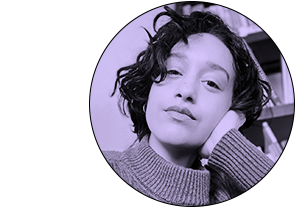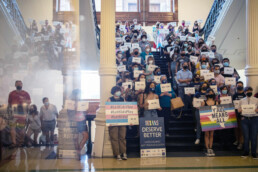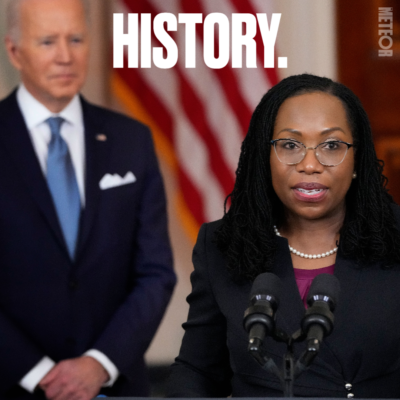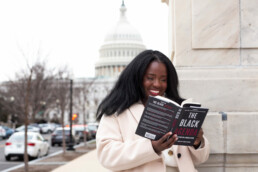When your existence is illegal
|
No images? Click here  February 25, 2022 Hello Meteor readers—it perhaps goes without saying that it’s been a rough week in the world; as I write this, Russian troops have invaded Kyiv, and stories are pouring in about people fleeing Ukraine to Poland, having walked on foot for a full day. We’ve compiled a list of ways to help Ukrainians on our Instagram here. In today’s newsletter, we’ve got four transgender writers reflecting on how Texas Governor Greg Abbott’s hateful decree—and the transphobic legislation being passed across the country—affects their lives. After that, read Shannon Melero’s interview with Anna Gifty Opoku-Agyeman, editor of a new book called The Black Agenda: Bold Solutions for a Broken System, which elevates Black expertise in areas where it’s rarely sought. There is some good news, thank goodness. President Biden has nominated Judge Ketanji Brown Jackson to the Supreme Court; he kept his promise that he would nominate the first Black woman to SCOTUS, but what’s most exciting is that he’s nominated the most progressive judge among the candidates he was reportedly considering. (Lawyer and writer Dahlia Lithwick predicted her nomination in a recent edition of our newsletter.) More on that below. Hold the line, everybody. And drop us one, too: [email protected]. —Julianne Escobedo Shepherd  WHY IS IT ALWAYS TEXASOur Existence Is a Crime  TEXANS PROTESTING PROPOSED BANS OF TRANS ATHLETES IN TEXAS, 2021 (PHOTO TAMIR KALIFA VIA GETTY IMAGES) On Wednesday, Texas Governor Greg Abbott signed a decree that essentially criminalizes trans kids and their parents, demanding that the Department of Family and Protective Services investigate parents who support and affirm their kids' gender identity as child abuse. Abbott also ordered doctors and teachers—and deputized individual citizens—to report trans children receiving life-affirming care. This draconian, hateful step was the most recent measure in a right-wing war on trans people in multiple states, which includes 125 anti-trans bills currently on the table, according to the Human Rights Campaign. So what does the Texas news mean to the people most affected? The Meteor founding member Jennifer Finney Boylan asked four writers to answer that question here. Brynn Tannehill
|
|
You are receiving this email because you have subscribed to our newsletter. |
![]()
What does a Black agenda look like?
“The glaring omission of Black experts is so commonplace across Western society that it has become normalized,” writes Anna Gifty Opoku-Agyeman in the opening pages of The Black Agenda: Bold Solutions for a Broken System. A graduate student at the Harvard Kennedy School, Gifty Opoku-Agyeman, wants to raise her hand and ask one monumental question: “why public discourse about a global pandemic, which disproportionately impacted Black communities, was largely absent of Black perspectives.” The collection of essays she compiles explores the "convergence of at least three pandemics: Covid-19, racism, and state-sanctioned police violence," and how each of those things affects sectors like climate change, tech, and healthcare in Black communities. (In one expansive section about the climate crisis, Dr. Marshall Shepherd writes, "Ultimately, however, the weather-climate gap will not disappear until racial wealth inequality disappears.”)
So what does a Black agenda look like? Let's talk to the editor!
Shannon Melero: The Black Agenda kicks off by noting that historically, Black experts are only ever called upon for things specifically about the Black community—or when someone is trying to get their DEI initiative up and running. There was a slight shift in this during the summer of 2020, which you write about. Have you noticed any change in the academic or research community moving toward no longer pigeonholing Black experts two years into the pandemic?
Anna Gifty Opoku-Agyeman: No. No. (Laughing) And it’s really because at the end of the day, as Doctor Tressie McMillan Cottom said recently, institutions can’t love you. Right? They’re things. And it’s no surprise. What I always tell people to keep in mind, with academic institutions, in particular, is that they were never built with Black and Brown people in mind. Harvard was founded in the 1600s. Where were Black people in the 1600s? So the way I really look at it is that, yes, institutions can’t love me. They won’t serve me. But that being said, I’m still going to push these institutions to at least see me, to hear me. Because at the end of the day, even if they aren’t hearing me, someone is listening, right?
One thing I noticed as a thread joining all of the essays was the argument for reparations. But what would you say is that one thing that brings all these experts’ concepts together?
Oh, reparations. I hadn’t even thought about it from that perspective, but you’re right, it does come up a lot. But I actually think the more salient or more obvious trend between the essays is criminal justice.
Just to be clear, nobody talked to each other before writing their essay. But as you see, criminal justice comes up again and again and again. Because at the end of the day, that is the root of a lot of the problems. If you already don’t see Black life as life, we have a problem. We can’t talk about voting rights. We can’t talk about health care reparations; we can’t talk about diversity in the workforce; we can’t talk about the future of work in the U.S. if you don’t think Black people are people.
And so the way that manifests is criminalizing Black people for existing. I can’t just be Black and exist because that is illegal. As I talk about this, I’m just thinking about what happened with Kim Potter recently. She basically got a slap on the wrist and the judge cried!
The statistic that shook me, and it still shocks me, is that out of 17,500 police killings between 2005 and 2021, only 140 officers were indicted in murder or manslaughter charges. That’s less than one percent! That’s actually 0.8 percent, to be precise. And the question becomes, well, when it’s fundamentally criminal to be Black in America, how does that spill over into every other sector of society? It’s illegal to be Black in America, and for some reason, that’s not top of mind for everybody.
So I guess the next logical question is, what’s the plan? It feels like this has been an ongoing battle for hundreds of years. How can we change this perspective, and is it even something that’s going to be accomplished in our lifetime?
I think it can. And I think it will be led by young people, I think we are going to be the ones to push against this idea in a very real way. That’s why you’re seeing such a visceral reaction. There are a lot of people who are trying to get rid of Black voting rights—I mean, it’s a coordinated effort that is giving Battleship precision, right?
There are entire generations of people who are sick of it. You’re seeing this [anger] in millennials, Gen Z, Gen X, and all of the people coming up after them. This is why you have this entire fight around what’s going to be taught in schools, however, because people [in power] understand that once young people find the truth, it changes everything. We saw that with Gen Z.
And what does implementing that level of change look like according to The Black Agenda?
It looks like putting Black people at the helm of conversation and having them lead the way. And that’s not at the expense of any other group. I think a lot of times people argue that if you’re centering one group of people, it means you don’t like anybody else. But who said that? What we’re saying is, what groups have it worse off? The group that is worse off should probably be leading the conversation around solutions because if a solution works for them, it’ll probably work for everyone else.
I can't just be Black and exist because that is illegal.
Now when we talk about agenda items in the book, what we’re saying is that with the way that things are going, Black lives have to be fully realized first and foremost. The fact that Black lives do matter is not something that should be up for debate, but right now it is up for debate. It doesn’t make any sense to me. Like, what do you mean? This isn’t debatable. The Black Agenda basically feeds off of the idea that if we know that Black life matters, we can address how the climate crisis is affecting Black lives, we can address health inequities, we can address how climate crises are affecting Black lives.
But you have to agree that Black life matters first. If you can’t agree with that fact then all of the other solutions proposed in the book are moot. The first step is you agreeing that Black people are people.

Shannon Melero is a Bronx-born writer on a mission to establish borough supremacy. She covers pop culture, religion, and sports as one of feminism's final frontiers.









